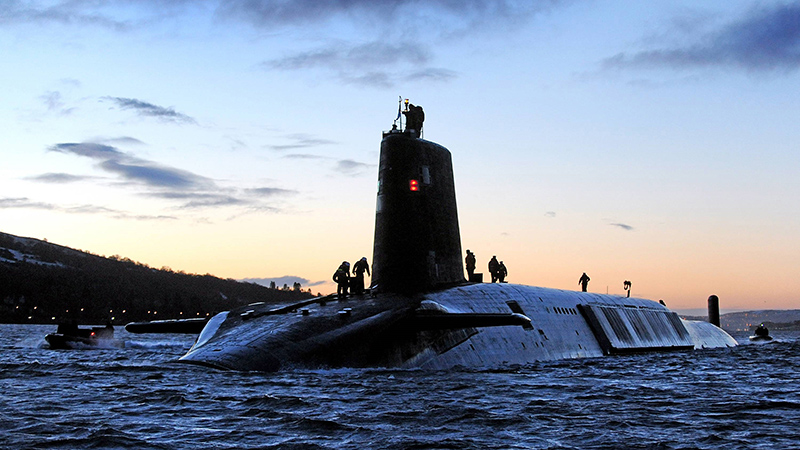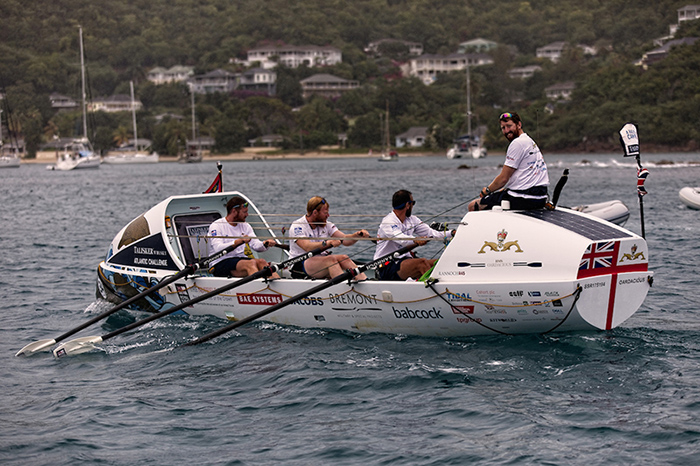
Whilst the experiences and practices may differ to what many are going through in their own homes, there are many useful practices and top-tips that have been ingrained into our culture and ethos as “Isolation Professionals” that we hope could help.

1. Interaction
On a submarine we live and work in close proximity with our shipmates, who become our friends and family for months on end. We rely on each other to fulfil our social needs, whilst also living in the hierarchical environment necessary to operate a nuclear submarine at sea. As far as contact with the outside world goes, we receive a weekly “Family-gram”; a 120-word message from our loved ones. This is our only connection to our families, to which we’re unable to respond; it provides a snapshot of a parallel universe where friends and family are getting on with their daily lives. The brevity of the message means it doesn’t contain a lot of detail, but the impact to morale is from the fact that there’s someone out there thinking of us - don’t worry if you don’t feel like you have much of interest to say, just making an effort to connect with someone is an enormous boost for you and your friend.
During our Atlantic row we had a satellite phone that allowed each rower to make a short 5-minute phone call home every other day. This was invaluable for two reasons; it became part of our routine, something to look forward to as well as marking the passage of time; and it became our therapy – an outlet for talking through our highs and lows for encouragement and commiserations.
Top Tips
- Take the time to make time for others every day. We are spoilt for choice with modern technology: so no excuses not to maintain contact, and to be creative with it.. Consider others, perhaps older relatives or friend who needs that connection now, more than ever, or if you know of a neighbour who could be struggling, consider sharing your phone number with them with a note passed through their letterbox.
- Compassion, empathy; many will be affected differently by some of the implications caused by the COVID-19 outbreak, from job security, childcare, homeschooling, anxiety, health concerns, loneliness to name but a few – a problem shared is a problem halved, share the load where you can by talking.

2. Routine
Whether you’re underwater on a submarine or drifting across the Atlantic Ocean on a rowing boat for weeks on end, it’s easy to lose sight of time which in turn can have a drastic effect on motivation, mental health and purpose.
Submariners live for routine; it breaks down a deployment into a structure that everyone can buy into and benefit from. We mostly work in six-hour blocks of time, alternating on and off duty, or ‘watch’, from the warfare watchkeepers in the Control Room, the chefs in the Galley, the weapons engineers in the Missile Compartment and “Bomb Shop” (the Torpedo compartment) and of course, the Marine Engineer watchkeepers overseeing the nuclear reactor, propulsion and other essential ship’s system. Our routine is broken down into professional and social milestones, whether it’s our “battle-rhythm” of planning and command meetings that take place throughout the patrol or the meals that our chefs provide us - Fish Fridays, Steak Saturdays and Pizza Night on Sundays - this structure helps differentiate our days, weeks and the months that we’re away. Down time is crucial to a successful and sustainable deployment, as such we are mindful to avoid burning our teams out, taking individual and team wellbeing into consideration.
We maintained a similar, though slightly more brutal, daily routine during our ocean row, each rowing two hours on two hours off, though our ‘off’ period included all boat and self-care maintenance, including navigation and boat maintenance. We each ‘owned’ a piece of the more detailed routine, which gave us purpose, while also ensuring the wellbeing of crew and equipment without collapsing into chaos and burn-out.
Top Tips
- Build a structure to your days and your week. If working from home try to map out your domestic and professional “battle-rhythm” and find the balance that works for you: work, downtime, socialising (digitally), and importantly exercise!

3. Exercise
It is no secret that exercise has such a positive impact on both the body and mind; it helps us release those feel good chemicals, helps us sleep better, and to cope with the inevitable stress and anxiety from 24-hour news cycle. I’ve always been impressed with the creativity of submariners; with space being such a premium there is not a designated “gym” on a submarine; we find the nooks and crannies of space onboard, free weights in the Torpedo compartment and cardio machines and pull up bars dotted around the Missile Compartment (scattered between the Trident Ballistic Missiles). The creativity of submariners often goes even further, we create ship’s company competitions – often a body weight circuit or rowing machine challenge, a simple concept that gets the whole crew involved, and breaks up the patrol with something fun and engaging.
Obviously we weren’t short of exercise on the row, but the rowing during the ocean crossing was almost the simple bit. The 18 months of preparation in the build-up was the real challenge, maintaining a steady, but intense regime when just getting the start line seemed so far away. It’s easy to put off a training session until tomorrow, and then the next day, and then… We spent months committing time and effort to sticking to a plan, fitting it into a routine, doing the training, managing rest, recovery and nutrition. We had to keep the bigger picture in our mind’s eye, each individual session was getting us closer to a more competitive race.
Top Tips
- Work-out from home: there are many ways to creatively enjoy exercise whether it’s a walk (whilst respecting all social distancing guidelines) or with a housebound workout from home/garden. The important thing is to set yourself goals and take realistic steps to work towards achieving them .If you can find fun ways of taking these steps, or turn it into a team competition then that’s even better!
- But don’t forget to rest, make time for recovery -sleep is invaluable. Throw in the injury prevention extras - yoga, Pilates, stretching etc; there are free apps and videos everywhere. Plan your exercise, treat it as importantly as any other aspect of your professional commitments and fit it into your routine. Try and see this period as an opportunity to change your perspective on exercise.

4. Nutrition
Submarine chefs are some of the most creative and hard-working people I’ve had the privilege of working with; catering for over 150 people and working round the clock in a 6 square-metre “galley” to feed the crew and provide healthy and enjoyable food. Meals, or in Navy-speak “Scran” forms an integral part of our routine; it breaks up the day and adds to the weekly structure. Beyond the nutritional benefits, it also gives us a sit-down moment to chat and bond with our shipmates away from work. We enjoy a treat too, “10 O’Clockers” or “4 O’clockers” which is a simple treat or snack ,, e.g. Tunnocks’ tea cakes, chocolate or the chefs might bake something up. The treat breaks up the day even further, a bit of morale and something to look forward to. Looking ahead in a four month patrol can be overwhelming, perhaps like the idea of a 12-week isolation period feels to you right now, but by breaking it into segments it can feel far more manageable.
During the our Atlantic crossing we were rowing over 12 hours and burning through 8,000 calories each per day. We relied on cold re-hydrated dry rations, not quite as appetising as a teacake, a lot of biltong, meal replacement supplements and snack bars. It was a different experience, the purpose of our food served two purposes: fuel and morale! We aimed to consume approx. 7,000 calories each per day to replace what we’d burned; we lost ~18Kg each over 37 days of rowing!. One of the morale foods, Haribo or “Morale-ibo”, whilst nutritionally pretty pointless served a purpose to get us through the long dark rainy nights.
Top Tips
- Take time to prepare meals, plan them and make an effort to learn and try something new. There are so many options and it's so easy take a bit of pride in treating meals as more than just fuel; take a risk and push yourself for an instant reward. If you are fortunate enough to be living with someone else, take it in turns, surprise each other, plan a themed meal, be creative, and most importantly, treat meal times as a moment to reconnect, away from work and hit that re-set button.
- Snacks, treats, rewards and cheat days; these have their place; we’re not all competing for a team GB Olympic spot where our body fat percentage could cost our job so enjoy something naughty every now and again. Treat the treat as a treat! It will make it so much more enjoyable and deserved.